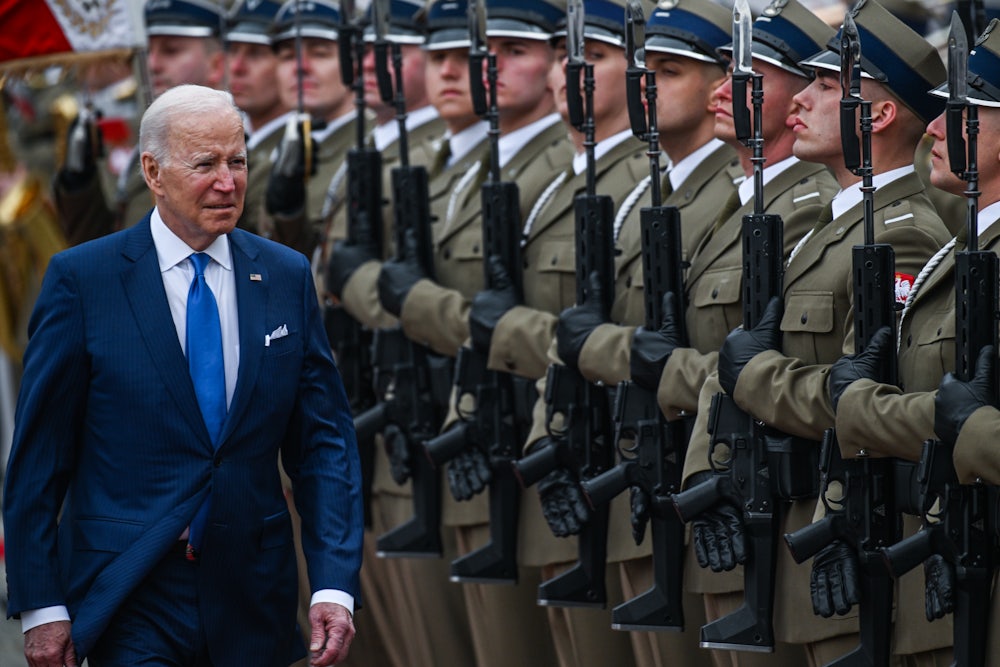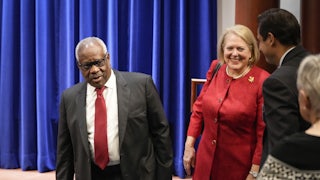On Saturday, President Biden delivered a speech in Warsaw, Poland, about the war in Ukraine that his aides billed as one of the most important of his presidency. Biden talked about the fight in Ukraine as a larger struggle in the “battle for democracy” and human freedom, but all anyone is talking about is his off-the-cuff remark about Russian President Vladimir Putin: “For God’s sake, this man cannot remain in power.”
This was a clear misstatement. Regime change in Moscow is not the position of the United States and is not the stated objective of U.S. support for Ukraine.
We know that Biden screwed up, because the White House immediately tried to walk back the president’s comments. That doesn’t happen when the president says something correctly.
Immediately, the conventional wisdom was that Biden had made a notable gaffe. However, by Monday, the conventional wisdom had shifted to applauding Biden’s statement: He said what he felt. What’s wrong with making Putin squirm a little?
Biden largely adopted this position. When asked about the controversy again, he told reporters he was simply “expressing the moral outrage I felt” and that he wasn’t articulating a policy change.
But that doesn’t fly, and neither do the efforts to explain away Biden’s misstatement. The fact is—and Biden knows this—if the president says something, it is policy. Many years ago, when I served in the State Department as a speechwriter, this simple maxim was constantly drilled into our heads. If we weren’t sure what the current policy on a particular foreign policy issue was, we checked what the president had recently said. Voilà, we had our answer.
The president of the United States doesn’t get the luxury of expressing moral outrage and calling for the removal of a foreign leader and then compartmentalizing it from U.S. policy.
No matter how Biden tries to spin this, one can be quite confident that Putin will not view his comments with the nuance that the president would prefer. Rather, Biden’s words will only feed the Russian leader’s conviction that NATO expansion into his country’s near-abroad (and military support for Ukraine) is simply regime change by another name.
As Chris Fettweis, a professor of international relations at Tulane University, said to me: “I don’t think you want to make a trapped rat any more desperate or paranoid.” And that’s what Biden has inadvertently done.
Already in the last few weeks, Biden has called Putin a “pure thug,” a “murderous dictator,” a “war criminal,” and a “butcher.” The State Department has also officially adopted the position that Russia is committing war crimes in Ukraine. These statements undercut America’s effectiveness as an honest broker in diplomatic negotiations aimed at ending the war.
But also, and here’s something almost no one has mentioned: They make it more difficult for the U.S. eventually to lift sanctions on Russia, which will almost certainly be a requirement of any cease-fire currently being negotiated between the two sides. How does Biden explain lifting sanctions on a country whose leader he believes is a war criminal and shouldn’t remain in power?
More likely than not, when the fighting has ended in Ukraine, Putin will remain in power. And the U.S., whether it likes it or not, cannot simply ignore the president of a country that has the eleventh-largest economy in the world (for now) and thousands of nuclear weapons.
Biden’s words also make life more difficult for America’s allies. Consider, for example, French President Emmanuel Macron’s response to Biden’s words. “I wouldn’t use terms like that because I’m still in talks with President Putin,” Macron said. “Our goal is to stop the war Russia launched in Ukraine while avoiding a war and escalation.”
Macron is making this statement because he’s fearful that, since France and the U.S. are allied against Russia’s war, he will be tarred by Biden’s comments. In other words, as the leader of NATO, Biden advocating regime change in Moscow could be interpreted by Putin as a statement of policy not just for the U.S. but also for NATO.
Biden has also played directly into the hands of the cohort of foreign policy hawks who want the U.S. to adopt a policy of regime change with regard to Putin. The short-term goal for the U.S. and its Western allies is to end the bloodletting in Ukraine. Biden’s words will make that goal harder to achieve and will embolden the regime change crowd.
If there’s one lesson that Biden and his team have consistently followed throughout the crisis in Ukraine, it’s to keep the focus off the U.S.—and on Russia and its deplorable actions in Ukraine. Biden’s statement is having the opposite effect. It’s not the end of the world, but no one should kid themselves into believing that Biden didn’t make a mistake. He definitely did.






